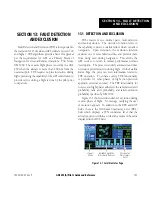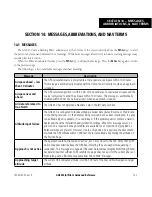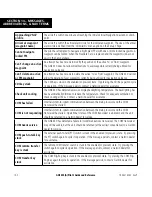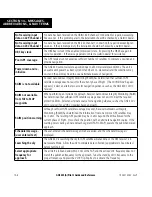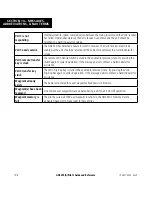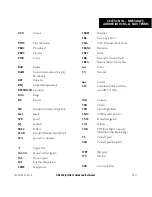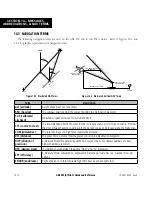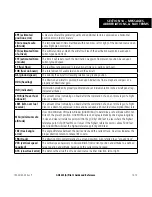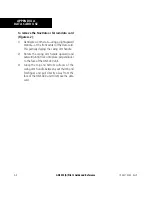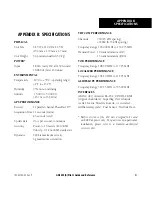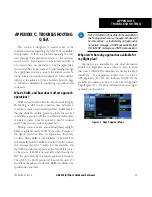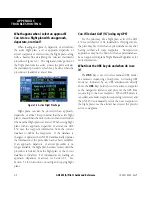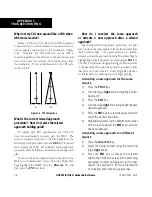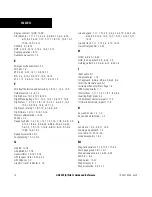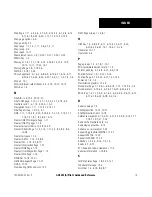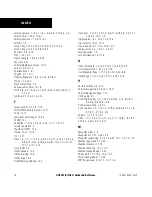
GNS 430(A) Pilot’s Guide and Reference
190-00140-00 Rev. P
SECTION 14 – MESSAGES,
ABBREVIATIONS, & NAV TERMS
14-13
EPE (estimated
position error)
A measure of satellite geometry quality and additional factors, expressed as a horizontal
position error in feet or meters.
ESA (enroute safe
altitude)
The recommended minimum altitude within ten miles, left or right, of the desired course on an
active flight plan or direct-to.
ETA (estimated time
of arrival)
The estimated time at which the aircraft will reach the destination waypoint, based upon
current speed and track.
ETE (estimated time
enroute)
The time it will take to reach the destination waypoint, from present position, based upon
current ground speed.
FF (fuel flow)
The fuel flow rate, expressed in fuel units per time (e.g., gallons per hour).
FOB (fuel on board)
The total amount of usable fuel on board the aircraft.
GS (ground speed)
The velocity the aircraft is travelling relative to a ground position.
HDG (heading)
The direction an aircraft is pointed, based upon indications from a magnetic compass or a
properly set directional gyro.
IND (indicated)
Information provided by properly calibrated and set instrumentation in the aircraft panel (e.g.,
indicated altitude).
LFOB (left-over fuel
onboard)
The amount of fuel remaining on board after the completion of a one or more legs of a flight
plan (or a direct-to).
LRES (left-over fuel
reserve)
The amount of fuel remaining on board after the completion of a one or more legs of a flight
plan (or a direct-to), expressed in time and based upon a known fuel consumption (flow) rate.
MSA (minimum safe
altitude)
Uses Grid Minimum Off-route Altitudes (Grid MORAs) to determine a safe altitude within ten
miles of the present position. Grid MORAs are one degree latitude by one degree longitude
in size and clear all reference points within the grid by 1000 feet in areas where the highest
reference point is 5000 feet MSL or lower. If the highest reference point is above 5000 feet,
the Grid MORA will clear the highest reference point by 2000 feet.
TKE (track angle
error)
The angle difference between the desired track and the current track. An arrow indicates the
proper direction to turn to reduce TKE to zero.
TRK (track)
The direction of movement relative to a ground position. Also referred to as “ground track”.
VSR (vertical speed
required)
The vertical speed necessary to descend/climb from current position and altitude to a defined
target position and altitude, based upon the current ground speed.
XTK (crosstrack error)
The distance the aircraft is off a desired course in either direction, left or right.
Содержание GNS 430
Страница 1: ...GNS 430 A Pilot s Guide and Reference ...
Страница 2: ......
Страница 28: ...GNS 430 A Pilot s Guide and Reference 190 00140 00 Rev P 1 20 SECTION 1 INTRODUCTION Blank Page ...
Страница 82: ...GNS 430 A Pilot s Guide and Reference 190 00140 00 Rev P 5 16 SECTION 5 FLIGHT PLANS Blank Page ...
Страница 116: ...GNS 430 A Pilot s Guide and Reference 190 00140 00 Rev P SECTION 6 PROCEDURES 6 34 Blank Page ...
Страница 250: ...GNS 430 A Pilot s Guide and Reference 190 00140 00 Rev P SECTION 14 MESSAGES ABBREVIATIONS NAV TERMS 14 14 Blank Page ...
Страница 254: ...GNS 430 A Pilot s Guide and Reference 190 00140 00 Rev P APPENDIX B SPECIFICATIONS B 2 Blank Page ...
Страница 265: ......

